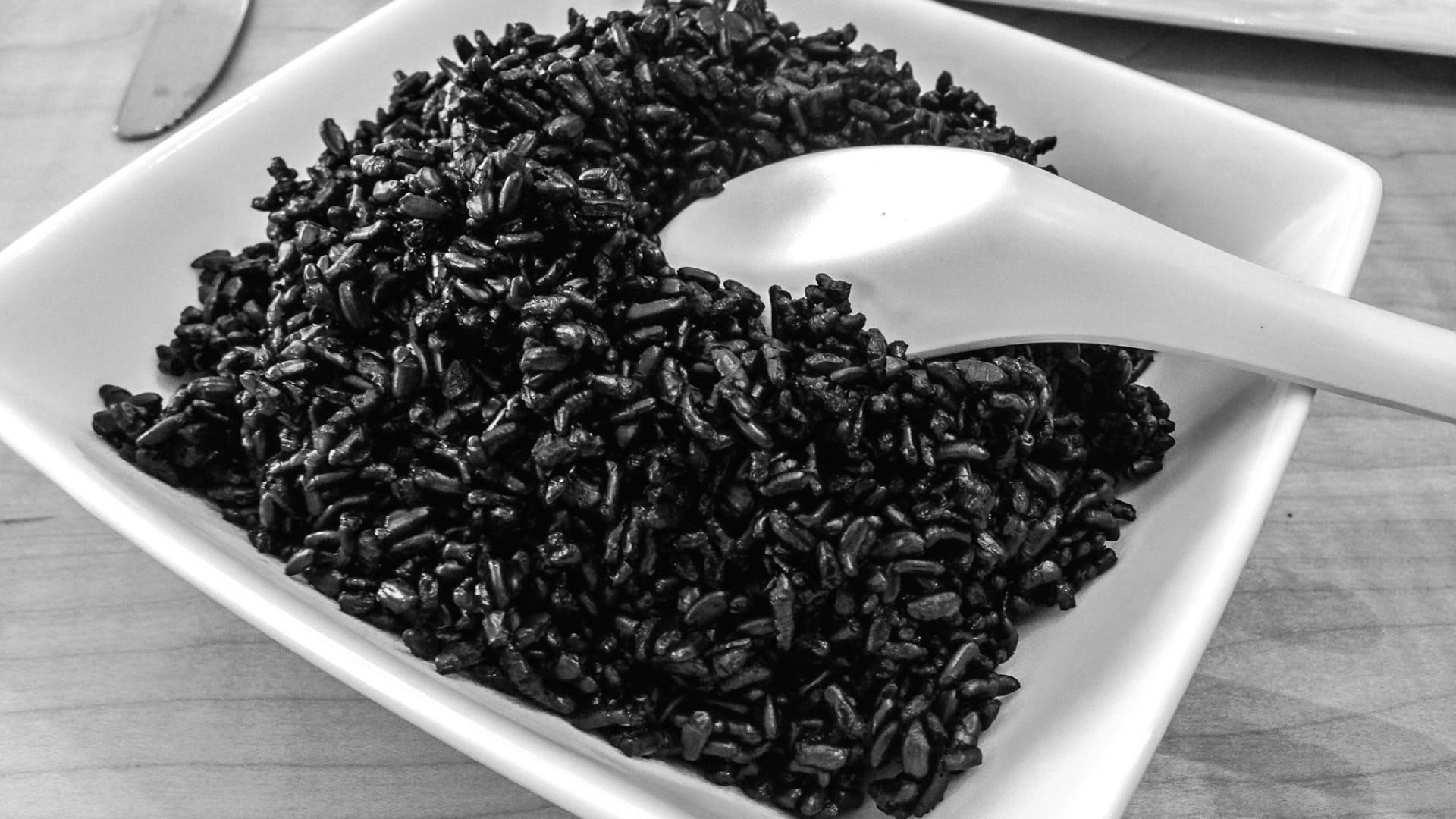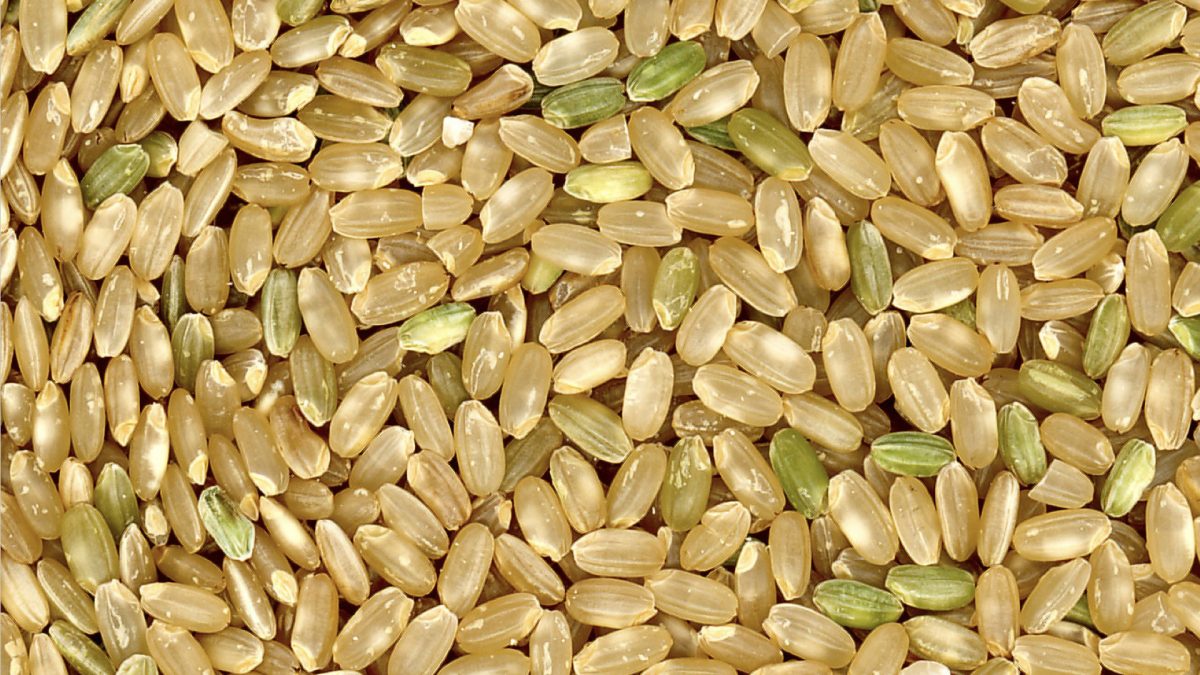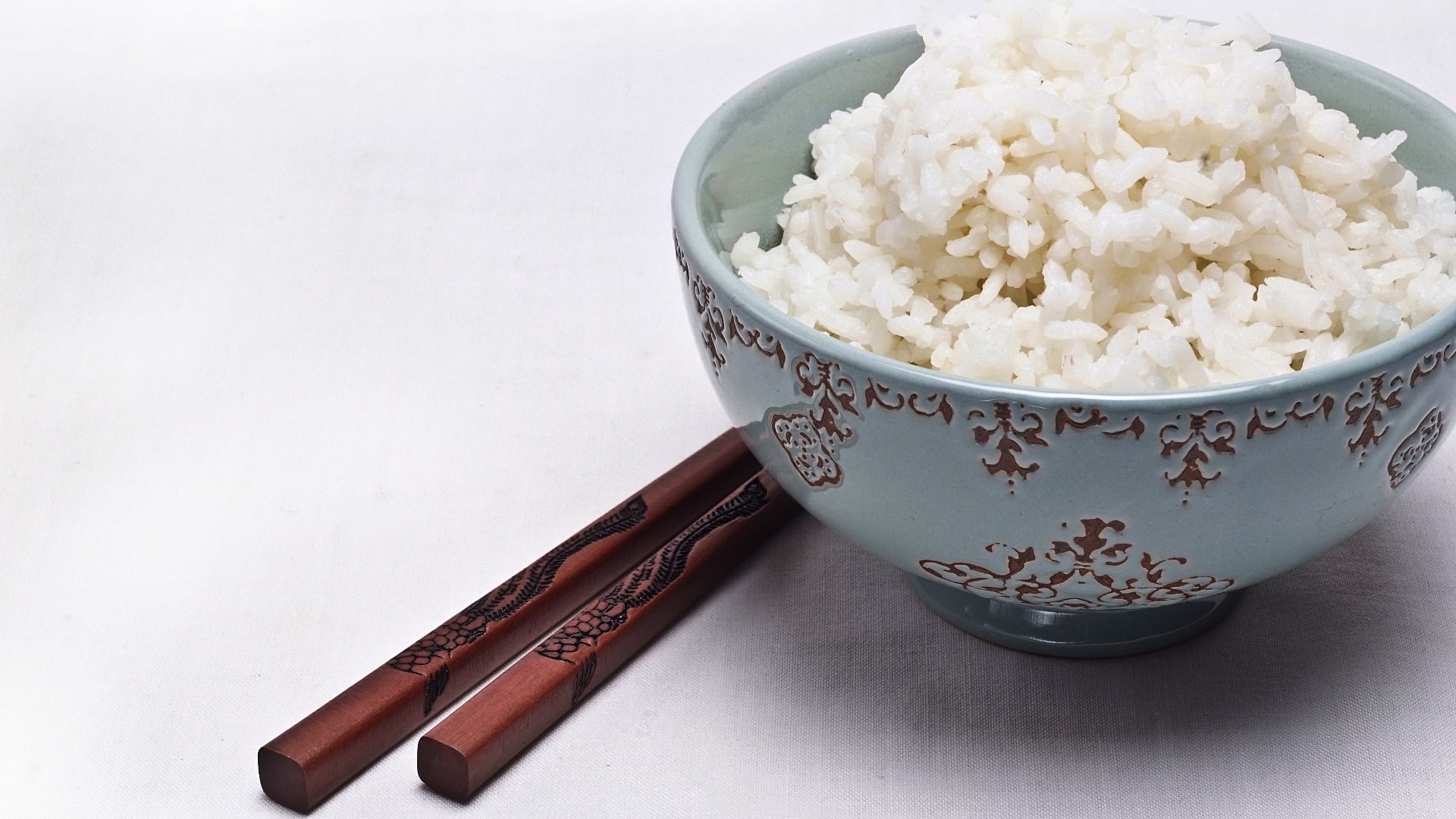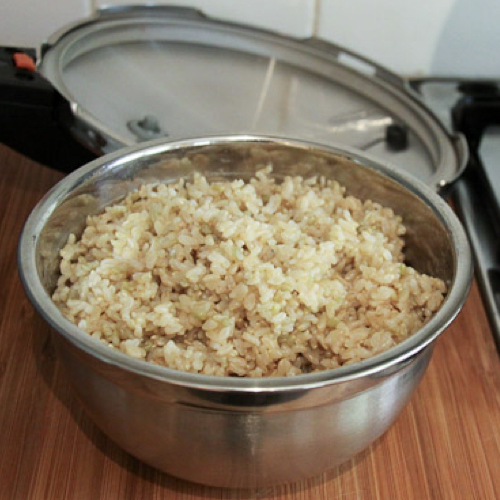
Rice
On average, high blood pressure medications reduce heart attack risk by 15 percent and stroke risk by 25 percent; in a randomized, controlled trial, three daily portions of whole grains, such as brown rice, also helped achieve this blood-pressure-lowering benefit. The study revealed that a diet rich in whole grains may yield the same benefits without the adverse side effects commonly associated with antihypertensive drugs, such as electrolyte disturbances in those taking diuretics; increased breast cancer risk for those taking calcium-channel blockers; lethargy and impotence for those on beta blockers; sudden, potentially life-threatening swelling for those taking ACE inhibitors; and an increased risk of serious fall injuries for apparently any class of these blood pressure drugs.
Whole-grain intake may also lower risks of type 2 diabetes, coronary heart disease, weight gain, and colon cancer. While whole grains appear to reduce our risk of developing chronic disease, however, refined grains may actually increase risk. Harvard University researchers, for example, found that regular brown rice consumption was associated with lower type 2 diabetes risk, but consuming white rice was associated with higher risk. Daily servings of white rice were associated with a 17 percent greater risk of diabetes, whereas replacing one-third of a serving a day of white rice for brown rice might lead to a 16 percent drop in risk.
What about our heart health? Given the improvements in cardiac risk factors seen in interventional trials of whole grains, it’s not surprising to see a reduction in the progression of arterial disease among those who regularly eat them. In studies of two of the most important arteries in the body, the coronary arteries that feed the heart and the carotid arteries that feed the brain, people eating the most whole grains appeared to have significantly slower narrowing of their arteries.
Consistent with recommendations from leading cancer and heart disease authorities, I recommend at least three daily servings of whole grains. As with vegetables, use color to make decisions at the grocery store. Beyond just comparing antioxidant content, there’s experimental evidence to suggest that pigmented grains such as red or black quinoa, or red, purple, or black rice has benefits over white or brown. For example, in addition to having about five times more antioxidants, colored rice varieties have shown greater anti-allergy activity in vitro, as well as superior anticancer effects against breast cancer and leukemia cells.
Concerns over the arsenic content of rice, however, has led to recommendations to reduce rice consumption in favor of other whole grains.
For substantiation of any statements of fact from the peer-reviewed medical literature, please see the associated videos below.
Image Credit: Belinda (miscdebris) / Flickr. This image has been modified.
Popular Videos for Rice


Cancer Risk from Arsenic in Rice & Seaweed
A daily half-cup of cooked rice may carry a hundred times the acceptable cancer risk...
Do the Pros of Brown Rice Outweigh the Cons of Arsenic?
Are there unique benefits to brown rice that would justify keeping it in our diet...
If White Rice Is Linked to Diabetes, What About China?
Protein consumption can exacerbate the insulin spike from high glycemic foods.
Arsenic in Infant Rice Cereal
When it comes to rice and rice-based products, pediatric nutrition authorities have recommended that arsenic...All Videos for Rice
-

Natural Ozempic Alternatives: Boosting GLP-1 with Diet and Lifestyle
Certain spices and the quinine in tonic water can boost GLP-1, but at what cost?
-

The Harms Associated with Eating More Southern-Style Food
Diet appears to mediate the majority of the racial health gap.
-

Plant-Based Eating Score Put to the Test
How can you get a perfect diet score?
-

Exploiting Sensory-Specific Satiety for Weight Loss
How can we use sensory-specific satiety to our advantage?
-

The Benefits of Millet for Diabetes
What were the remarkable results of a crossover study randomizing hundreds of people with diabetes to one and a third cup of millet every day?
-

Is Sorghum a Healthy Grain?
How does sorghum compare with other grains in terms of protein, antioxidants, and micronutrients? And the benefits of red sorghum compared to black and white varieties.
-

Benefits of Quinoa for Lowering Triglycerides
How do the nutrition and health effects of quinoa compare to whole grains?
-

Evidence-Based Weight Loss – Live Presentation
In this live presentation, Dr. Greger offers a sneak peek into his book How Not to Diet.
-

The Best Diet for Colon Cancer Prevention
What would happen within just two weeks if you swapped the diets of Americans with that of healthier eaters?
-

The Best Diet for Diabetes
The case for using a plant-based diet to reduce the burden of diabetes has never been stronger.
-

Benefits of a Macrobiotic Diet for Diabetes
What happens when you add massive amounts of carbs to the daily diet of type 2 diabetics in the form of whole grains?
-

Pros and Cons of a Macrobiotic Diet
What happens when you put diabetics on a diet composed of largely whole grains, vegetables, and beans?
-

How to Prevent Alzheimer’s with Diet
What evidence is there that our meat-sweet diets play a cause-and-effect role in dementia?
-

Dining by Traffic Light: Green Is for Go, Red Is for Stop
In this video, I explain my traffic light system for ranking the relative healthfulness of Green Light vs. Yellow Light vs. Red Light foods.
-

Benefits of Turmeric for Arsenic Exposure
What happened when turmeric curcumin was put to the test to see if it could reverse DNA damage caused by arsenic exposure?
-

What About Coconuts, Coconut Milk, and Coconut Oil MCTs?
Do the medium-chain triglycerides in coconut oil and the fiber in flaked coconut counteract the negative effects on cholesterol and artery function?
-

Do the Pros of Brown Rice Outweigh the Cons of Arsenic?
Are there unique benefits to brown rice that would justify keeping it in our diet despite the arsenic content?
-

Is White Rice a Yellow-Light or Red-Light Food?
Do the health benefits of rice consumption outweigh any potential risk from the arsenic contamination?
-

How Much Arsenic in Rice Is Too Much?
What are some strategies to reduce arsenic exposure from rice?
-

How Risky Is the Arsenic in Rice?
Getting rice down to the so-called safe water limit for arsenic would still allow for roughly 500 times greater cancer risk than is normally considered acceptable.
-

Arsenic in Rice Milk, Rice Krispies, & Brown Rice Syrup
I recommend people switch away from using rice milk.
-

Arsenic in Infant Rice Cereal
When it comes to rice and rice-based products, pediatric nutrition authorities have recommended that arsenic intake should be as low as possible.
-

How to Cook Rice to Lower Arsenic Levels
Boiling rice like pasta reduces arsenic levels, but how much nutrition is lost?
-

Which Brands & Sources of Rice Have the Least Arsenic?
Arsenic levels were tested in 5,800 rice samples from 25 countries.
-

Which Rice Has Less Arsenic: Black, Brown, Red, White, or Wild?
Brown rice contains more arsenic than white rice, but the arsenic in brown rice is less absorbable, so how does it wash out when you compare the urine arsenic levels of white-rice eaters to brown-rice eaters?
-

Cancer Risk from Arsenic in Rice & Seaweed
A daily half-cup of cooked rice may carry a hundred times the acceptable cancer risk of arsenic. What about seaweed from the coast of Maine?
-

Where Does the Arsenic in Rice, Mushrooms, & Wine Come From?
What happens when our crops are grown in soil contaminated with arsenic-based pesticides and arsenic drug-laced chicken manure?
-

The Effects of Avocados and Red Wine on Meal-Induced Inflammation
Whole plant sources of sugar and fat can ameliorate some of the postprandial (after-meal) inflammation caused by the consumption of refined carbohydrates and meat.
-

How to Prevent Blood Sugar & Triglyceride Spikes After Meals
Within hours of eating an unhealthy meal, we can get a spike in inflammation, crippling our artery function, thickening our blood, and causing a fight-or-flight nerve response. Thankfully, there are foods we can eat at every meal to counter this reaction.
-

Best Foods for Polycystic Ovary Syndrome (PCOS)
Which foods and cooking methods should we choose and avoid, given the role advanced glycation end products (glycotoxins) may play in polycystic ovary syndrome (PCOS)?
-

Wakame Seaweed Salad May Lower Blood Pressure
Seaweed salad is put to the test for hypertension.
-

Gut Microbiome – Strike It Rich with Whole Grains
What can we eat to increase good gut bacteria richness in our colon?
-

The Hispanic Paradox: Why Do Latinos Live Longer?
Despite less education on average, a higher poverty rate, and more limited access to health care, U.S. Hispanics tend to live the longest. Why?
-

Can Morbid Obesity Be Reversed Through Diet?
How extreme was Dr. Kempner’s rice diet compared to traditional surgical approaches? Is there a safer alternative?
-

Is It Worth Switching from White Rice to Brown?
What happens when brown rice is put to the test in a randomized controlled crossover trial?
-

Optimal Vinegar Dose
How much vinegar should you consume with a meal to improve satiety and reduce the spike in blood sugar, insulin, and triglycerides?
-

Vinegar and Artery Function
Sprinkling vinegar on greens may augment their ability to improve endothelial function.
-

Brown, Black, Purple, and Red Unlike White on Rice
White rice is missing more than fiber, vitamins, and minerals. Phytonutrients such as gamma oryzanol in brown rice may help explain the clinical benefits, and naturally pigmented rice varieties may be even healthier.
-

Almonds for Osteoporosis
What happens when you take blood from people before and then again four hours after almond consumption, and drip that blood on bone cells?
-

The Five-to-One Fiber Rule
A guideline is suggested for how to read food labels for grain products such as bread and breakfast cereals.
